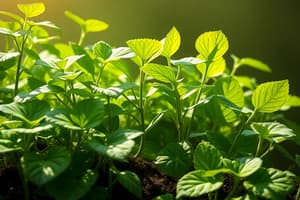Podcast
Questions and Answers
Which process occurs in the mitochondria of cells?
Which process occurs in the mitochondria of cells?
- Photosynthesis
- Nutrition
- Transportation
- Respiration (correct)
What type of transport requires energy to move molecules against their concentration gradient?
What type of transport requires energy to move molecules against their concentration gradient?
- Osmosis
- Passive transport
- Active transport (correct)
- Facilitated diffusion
Which organ is responsible for breaking down fats and removing waste products?
Which organ is responsible for breaking down fats and removing waste products?
- Liver (correct)
- Kidneys
- Skin
- Lungs
What is the process by which light energy is converted into chemical energy?
What is the process by which light energy is converted into chemical energy?
What is the equation for respiration?
What is the equation for respiration?
What type of reproduction involves two parents and genetically diverse offspring?
What type of reproduction involves two parents and genetically diverse offspring?
What is the process by which cells generate energy from glucose?
What is the process by which cells generate energy from glucose?
What is the type of nutrition that involves the acquisition of energy from light?
What is the type of nutrition that involves the acquisition of energy from light?
Flashcards are hidden until you start studying
Study Notes
Life Processes
Nutrition
- Involves the acquisition, processing, and utilization of nutrients for energy and growth
- Types:
- Autotrophic nutrition (self-feeding): plants, algae, and some bacteria
- Heterotrophic nutrition (other-feeding): animals, fungi, and some bacteria
Photosynthesis
- Process by which light energy is converted into chemical energy
- Occurs in chloroplasts of plant cells
- Equation: 6 CO2 + 6 H2O + light energy → C6H12O6 (glucose) + 6 O2
Respiration
- Process by which cells generate energy from glucose
- Occurs in mitochondria of cells
- Equation: C6H12O6 (glucose) + 6 O2 → 6 CO2 + 6 H2O + ATP (energy)
Transportation
- Movement of substances within organisms
- Types:
- Passive transport: diffusion, osmosis, facilitated diffusion
- Active transport: requires energy, pumping molecules against concentration gradient
Excretion
- Removal of waste products from the body
- Types:
- Kidneys (urine): filter waste and excess substances from blood
- Lungs (exhaled air): remove CO2 and H2O
- Skin (sweat): remove excess salt and water
- Liver (bile): break down fats, remove waste products
Coordination and Control
- Regulation of body functions through nervous and hormonal systems
- Nervous system: nerve cells (neurons) transmit signals
- Hormonal system: chemical messengers (hormones) regulate processes
Growth and Development
- Increase in size and complexity of organisms
- Involves cell division, differentiation, and growth
- Regulated by hormones and genetic factors
Reproduction
- Production of offspring to ensure species survival
- Types:
- Asexual reproduction: single parent, identical offspring (e.g., bacteria, plants)
- Sexual reproduction: two parents, genetically diverse offspring (e.g., animals, humans)
Life Processes
Nutrition
- Involves the acquisition, processing, and utilization of nutrients for energy and growth
- Autotrophic nutrition: plants, algae, and some bacteria make their own food using sunlight
- Heterotrophic nutrition: animals, fungi, and some bacteria obtain energy by consuming other organisms
Photosynthesis
- Light energy is converted into chemical energy, stored in glucose
- Occurs in chloroplasts of plant cells, using chlorophyll
- Produces glucose and oxygen as byproducts
Respiration
- Cells generate energy from glucose, releasing ATP
- Occurs in mitochondria of cells, using oxygen
- Produces carbon dioxide and water as byproducts
Transportation
- Movement of substances within organisms, maintaining homeostasis
- Passive transport: diffusion, osmosis, and facilitated diffusion, no energy required
- Active transport: energy-driven, pumping molecules against concentration gradient
Excretion
- Removal of waste products from the body, maintaining homeostasis
- Kidneys filter waste and excess substances from blood, producing urine
- Lungs remove CO2 and H2O through exhaled air
- Skin removes excess salt and water through sweat
- Liver breaks down fats, removing waste products through bile
Coordination and Control
- Regulation of body functions through nervous and hormonal systems
- Nervous system: nerve cells (neurons) transmit signals, allowing for rapid responses
- Hormonal system: chemical messengers (hormones) regulate processes, often slowly
Growth and Development
- Increase in size and complexity of organisms, involving cell division, differentiation, and growth
- Regulated by hormones and genetic factors, ensuring proper development
Reproduction
- Production of offspring to ensure species survival
- Asexual reproduction: single parent, producing genetically identical offspring (e.g., bacteria, plants)
- Sexual reproduction: two parents, producing genetically diverse offspring (e.g., animals, humans)
Studying That Suits You
Use AI to generate personalized quizzes and flashcards to suit your learning preferences.




